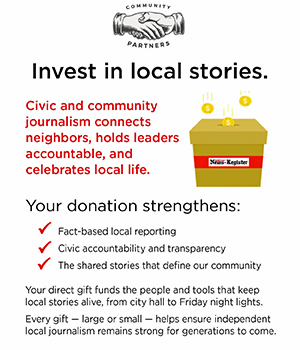Judge candidates on their own credentials
The underlying story of this month’s Yamhill County primary election is the union slate, featuring three candidates on the ballot.
This is not an official slate being advertised by the Yamhill County Employees Association. But the union certainly isn’t trying to hide its activities, either.
Josh Rojas, president of the YCEA, and Chelsey Williams, wife of a county employee, have conducted several joint campaign events. And union lawyer Jennifer Chapman is easily outspending her opponents in a circuit judge race, thanks to $5,000 cash contributions each from the local and state union.
Such a political movement is far from surprising in Oregon, or in other states where political contributions from public employee unions match or exceed those of private-sector interests. Locally, it’s fair to speculate that the collective bargaining process with county officials last year, which progressed to the brink of strike, triggered the fielding of a full slate of union candidates, aspiring to seats on the bench or board of commissioners, the latter representing the other side of the bargaining table.
Oregon unions have been major forces in funding candidates and measures for many years. Recently, they began focusing on supplying candidates themselves through the Oregon Labor Candidate School, which trains union employees considering runs for office, giving them precific skills to use along the campaign trail.
Public-sector union power in local, state and national elections could, however, soon come to a screeching halt.
In February, the U.S. Supreme Court heard arguments in Janus v. AFSCME — the American Federation of State, County and Municipal Employees, parent of the local county union.
At issue are mandatory union fees assessed and collected in 22 states, including Oregon. They are charged to all employees, not just those belonging to the union, on the theory the union expends its resources supporting better pay and benefits for them as well.
A 1977 case paved the way, declaring all employees benefit from representation, thus all should pay their “fair share.” That 1977 decision ruled out use of mandatory fees for political activities, but not for forms of more direct advocacy.
A movement of right-wing interests and individuals is now underway, contending no matter how it is spun, “fair share” fees ultimately go toward political activities that may violate an employee’s personal philosophy.
Such is the case with Debora Nearman, wife of State Rep. Mike Nearman, who is suing Service Employees International Union Local 503 over the issue. The union represents her as a Department of Fish and Wildlife employee, but spent more than $50,000 backing her husband’s opponent in 2016.
A case similar to Janus v. AFSCME last year produced a 4-4 deadlock. With the addition of conservative Justice Neil Gorsuch, many believe the anti-union front will be celebrating victory when the decision is handed down in June.
In that event, the unions will, of course, berate the Republican Party for anti-union sentiment allegedly hurting working class Americans. And that has some merit.
However, public-sector unions must accept the fact that the exponential rise in their political involvement in recent years helped set the stage. So its demise could be, at least in some part, their own doing.
Unions have played a vital role in helping ensure fair labor practices. Combating the maleficent ways of some capitalists, unions have helped guarantee fair wages, working environments and benefits for the mostly blue-collar trade workers creating the profit for owners and stockholders.
Over the decades, however, union participation has decreased heavily in the private sector and swelled dramatically in the public sector. According to the Bureau of Labor Statistics, 6.5 percent of private-sector workers were represented in 2017, compared to 34.4 percent of public-sector workers.
This occurred despite warnings from early union advocates, including Teddy Roosevelt and George Meany, the first president of the AFL-CIO. In 1955, Meany told The New York Times, “It is impossible to bargain collectively with the government.”
Needless to say, this is a time for American society to reexamine the role of unions in our workforce, especially in the public sector. But other than a history lesson, we offer this piece of advice pertaining to the local election:
Examine the candidates on their individual accomplishments, experience, skills and philosophies.
In this editorial board’s endorsements for the primary, we backed one of the three union candidates. While special interest influences certainly play a role, we vetted the candidates based on their own substance and qualifications.











Comments